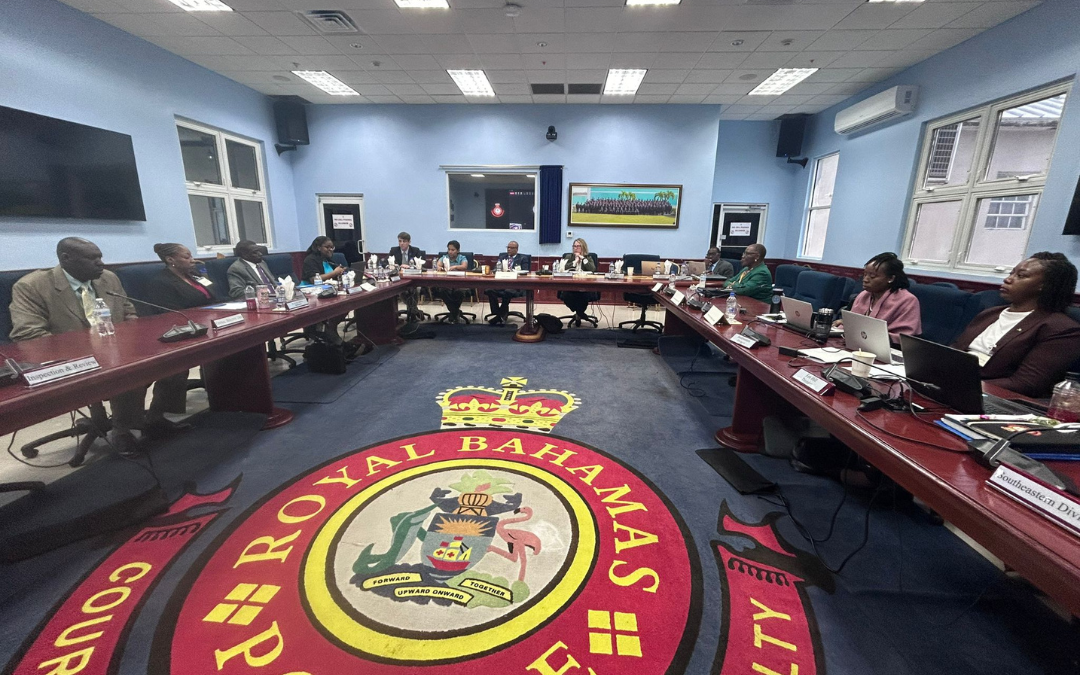
Nov 19, 2024 | Conventional Arms Programme
From 19 to 21 November 2024, 33 officials from various law enforcement, legal, and scientific institutions in Trinidad and Tobago participated in the Combating Trafficking in Arms and Ammunition (CTAM). This training was organized by the United Nations Regional Centre for Peace, Disarmament and Development in Latin America and the Caribbean (UNLIREC) in collaboration with the Ministry of National Security.
Participants included representatives from the Ministry of National Security, the Ministry of Legal Affairs, the Ministry of Foreign Affairs, the Trinidad & Tobago Police Service, the Trinidad & Tobago Municipal Police Service, the Port Authority Police, and the Customs and Excise Division of the Ministry of Finance. They received up-to-date training and on arms and ammunition trafficking including the issue of privately manufactured firearms.
During the event’s opening, Trinidad and Tobago Police Service Commissioner Erla Harewood-Christopher emphasized the importance of up-to-date training and collaborative efforts among law enforcement and civilian agencies to address the rising rates of firearms-related crimes and the emerging threat of privately manufactured firearms.
The Honorable Fitzgerald E. Hinds, Minister of National Security of Trinidad and Tobago; Mr Scott Hansen, Political-Economic Counselor at the U.S, Embassy in Trinidad and Tobago; and Ms. Quinnelle-Marie Kangalee, Programme coordinator at UNLIREC, also attended the launch.
The Honorable Minister and Mr Hansen highlighted the increasing threat of transnational organized crime in Trinidad and Tobago and the wider Caribbean, underscoring the significance of the training and encouraging participants to apply what they learned.
The CTAM course offers both theoretical and practical knowledge on global and regional trends in arms trafficking, methods of illicit manufacture, control systems for international transfers of firearms and ammunition, including brokering, and tools for international cooperation against firearms trafficking.
This edition of the CTAM featured presentations from the Trinidad and Tobago Police Service (including the Police Armoury and Firearms Permit Unit), the Customs & Excise Division, and the Bureau of Alcohol, Tobacco Firearms and Explosives (ATF), as well as CARICOM IMPACS. These sessions focused on firearms trafficking trends and the licensing and importat/export processes for firearms and accessories in Trinidad and Tobago, with IMPACS providing an overview of the Crime Gun Intelligence Unit (CGIU).
The CTAM course is part of UNLIREC’s project “Combating Illicit Firearms and Ammunition Trafficking in the Caribbean”, funded by the Bureau of International Narcotics and Law Enforcement Affairs (INL) of the United States. It aligns with the 2001 UN Programme of Action on Small Arms, the Arms Trade Treaty, and the 2030 Agenda for Sustainable Development. This initiative to regional efforts to prevent the illicit trafficking of firearms and ammunition, reduce firearms-related crimes, and support the Caribbean Firearms Roadmap.

Nov 15, 2024 | Conventional Arms Programme
NEW YORK, 11 November (Office for Disarmament Affairs) — The United Nations Regional Centre for Peace, Disarmament and Development in Latin America and the Caribbean (UNLIREC) is delighted to announce the launch of its new podcast series, Women, Forces of Change: The Podcast, which is dedicated to highlighting the voices of women from Latin America and the Caribbean who work in disarmament.
Over the course of 10 episodes, listeners will be invited to reflect on the importance of women’s voices in peace, security and disarmament. “At UNLIREC, we are proud to provide a platform that celebrates and supports women who are making forward strides in traditionally male-dominated fields,” said Soledad Urruela, Director of UNLIREC. “This podcast will spotlight their achievements, the challenges they overcome, and their vision for a safer and more equitable world.”
Women, Forces of Change: The Podcast features a diverse lineup of women, including experts, diplomats, policymakers and civil society leaders from across Latin America and the Caribbean, who will share their personal journeys and insights on advancing peace and security worldwide.
Featured guests include inspiring women leaders such as Kettly Julien (Haiti), Ana Pamela Romero (Mexico), Mayla Alejandra de León (Guatemala), Clarissa Rojas (Peru), Elizabeth Ward (Jamaica), Tamika Henry (Guyana), Nadine Bushell (Trinidad and Tobago), Constanza Bucarey (Chile), Carina Solmirano (Argentina) and Juliana Aguiar (Brazil). A special episode will feature Maritza Chan Valverde, Permanent Representative of Costa Rica to the United Nations, and Dennis Francis, Permanent Representative of Trinidad and Tobago to the United Nations, who, together with Ms. Urruela, will reflect on the progress in the United Nations General Assembly resolution on women, disarmament, non-proliferation and arms control. The podcast series launched on 8 November and will run for a month, with the final episode airing on 8 December to coincide with the fourteenth anniversary of the adoption of the resolution.
Women, Forces of Change: The Podcast will be available on platforms, such as Spotify and YouTube, and will feature conversations in English, Spanish and French.
For more information, please visit https://unlirec.org/en/publicacion/women-forces-of-change-the-podcast/ and follow UNLIREC on Instagram, Facebook, X (Twitter) and LinkedIn.
Background
Women, Forces of Change: The Podcast is funded by the Government of Canada and is aimed at strengthening and promoting the key role of Latin American and Caribbean women in disarmament and security in the region.
This podcast series builds on UNLIREC’s original publication series Women, Forces of Change, which has highlighted the contributions and perspectives of over 200 women in disarmament since 2012.
About UNLIREC
The United Nations Regional Centre for Peace, Disarmament and Development in Latin America and the Caribbean, is one of three regional centres under the United Nations Office for Disarmament Affairs. Since its establishment in 1986, the Regional Centre for Peace, Disarmament and Development in Latin America and the Caribbean has worked to promote peace, security and disarmament in the region.
For more information, please contact information@unlirec.org.

Nov 14, 2024 | Conventional Arms Programme
From 13 to 14 November 2024, the Caribbean Community (CARICOM) and the Dominican Republic held the 4th Annual Meeting of States of the Caribbean Firearms Roadmap. This meeting, which was held virtually, brought together government officials, international partners and key stakeholders to assess progress in combatting illicit firearms trafficking in the Caribbean and to chart the way forward for enhancing regional cooperation. The meeting was organized by the United Nations Regional Centre for Peace, Disarmament and Development in Latin America and the Caribbean (UNLIREC), in partnership with the CARICOM Implementation Agency for Crime and Security (CARICOM IMPACS).
Izumi Nakamitsu, High Representative for Disarmament Affairs at the United Nations, delivered opening remarks in which she reflected on the successes of the Caribbean Firearms Roadmap and emphasized that it has become a critical regional framework for cooperation in arms control. “With sustained support from the international community, Roadmaps are proving to be effective, sustainable, and comprehensive mechanisms for enhancing arms control and ammunition management”, she said. She also commended the countries that have adopted National Action Plans as part of the operationalization of the Roadmap and encouraged others to finalize their plans as soon as possible.
In his remarks, Callixtus Joseph, Assistant Director for Policy, Strategy and Innovation (Ag.) from CARICOM IMPACS, underscored the importance of the Caribbean Firearms Roadmap as a key instrument in the region’s response to firearms trafficking. He emphasized the significance of the meeting by saying that “This meeting represents a critical opportunity to evaluate our progress, exchange ideas, and reaffirm our commitment to and strengthen our resolve against gun violence”.
The two-day meeting featured high-level discussions, technical exchanges and updates from national focal points and international partners.
The first day focused on providing an overview of the Roadmap’s implementation, with a ministerial-level dialogue, which offered participants the opportunity to reflect on the relevance of the Roadmap and its implementation in the context of national priorities and strategies. Through reflecting on the progress achieved by States to date, participants were able to identify areas where further support is still needed, chiefly among them being the development of monitoring and reporting capabilities. Meeting participants also shared concrete results of capacity building activities carried out thus far and underscored the importance of partnerships and regional cooperation in combating illicit firearms trafficking.
A key point stressed during the meeting was the continued importance of the support by donors and implementing partners in achieving the Roadmap’s objectives. The contributions of partners and co-custodians were showcased in a video produced by UNLIREC, wherein representatives from the various organizations shared insights from their work in the region in support of the Roadmap. The significant contributions of donor countries such as Canada, Germany, the United Kingdom, the United States, and the European Union were also highlighted as a clear demonstration of the international community’s commitment to assisting the region in its efforts to combat the illicit flow of firearms.
In the second day of the meeting, national focal points shared and discussed their experiences and progress over the past year, identifying challenges encountered in implementing the Roadmap’s actions, as well as the capacity-building needs that still need to be addressed. Looking ahead, participants outlined key priorities for the upcoming 2025 Midterm Review of the Roadmap.
Background
The Caribbean Firearms Roadmap is a regional umbrella framework adopted by CARICOM States and the Dominican Republic in 2020, in which States commit themselves to implement concrete actions against illicit firearms trafficking and make the Caribbean a safer region. To date, 16 countries in the region have formally adopted the Roadmap, and many have developed National Action Plans to tailor the framework to their unique national contexts. The Roadmap signifies a commitment by States of the region to implement sustainable solutions to prevent and combat armed violence and crimes that are aligned with international norms and the broader goal of promoting sustainable peace, security and development across the Caribbean.
About UNLIREC
The United Nations Regional Centre for Peace, Disarmament and Development in Latin America and the Caribbean (UNLIREC) is one of three regional centres under the United Nations Office for Disarmament Affairs. Since its establishment in 1986, UNLIREC has worked to promote peace, security and disarmament throughout the region.
For more information, please contact secretary@unlirec.org.

Oct 21, 2024 | Conventional Arms Programme
From 21 to 25 October 2024, 35 representatives of various institutions responsible for firearms and ammunition control in Paraguay participated in the Course on Combating Trafficking in Arms and Ammunition (CTAM). This training was organized by the United Nations Regional Centre for Peace, Disarmament and Development in Latin America and the Caribbean (UNLIREC) in collaboration with the Ministry of Foreign Affairs of Paraguay and support from the Directorate of War Materiel (DIMABEL).
Participants included representatives from the National Administration of Navigation and Ports, the National Defense Council, the National Directorate of Civil Aeronautics, the Directorate of War Materiel, the National Directorate of Tax Revenue, the National Directorate of Migration, the Ministry of the Interior, the Ministry of National Defense, the Ministry of Foreign Affairs, the General Naval Prefecture, and the Secretariat for the Prevention of Money Laundering. They shared their experiences and challenges in addressing the issue of arms trafficking.
During the opening session, Colonel Marcos Mendoza Fretez from DIMABEL, Mr. Francisco Oxilia Vera from the Ministry of Foreign Affairs, and Mr. Gordon Kricke, Ambassador of the Federal Republic of Germany to Paraguay, emphasized the importance of strengthening national capacities and enhancing international cooperation to prevent and combat the diversion and illicit trafficking of arms and ammunition —an issue that significantly impacts the region.
The objective of the CTAM was to equip national authorities with the knowledge and technical tools necessary to implement strategies for preventing and combating illicit trafficking in firearms and ammunition in line with international instruments. The course covered a range of topics, including a overview of illicit firearms trafficking trends in Latin America and the Caribbean, methods used for the illicit manufacture and trafficking of firearms, and the vital role of control systems and documentation for international transfers of and ammunition in preventing and combating these crimes.. It also addressed measures to prevent illicit brokering and explored mechanisms and tools for international cooperation in cases of firearms trafficking. INTERPOL contributed to the course by sharing insights on recent joint operations in the region, trends in illicit trafficking , and tools available to member states for facilitating information exchange and promoting international cooperation.
Representatives from DIMABEL, the agency responsible for arms oversight in Paraguay, showcased national efforts to strengthen firearms control and combat diversion and illicit trafficking of arms and ammunition. A notable initiative is the implementation of the DIMABEL Integrated System (SID), a national registry that consolidates all activities related to firearms and related materials conducted by individuals and commercial entities. Together with the Ministry of Foreign Affairs, they presented mechanisms for international cooperation, fostering an environment for inter-institutional information exchange and the sharing of best practices.
The CTAM course is part of the project “Supporting the Implementation of Subregional, Regional and Global Instruments and Frameworks Related to Small Arms Control and Ammunition Management Across Latin America and The Caribbean”, funded by Germany.

Oct 16, 2024 | Conventional Arms Programme
From 7 to 16 October 2024, the United Nations Regional Center for Peace, Disarmament and Development (UNLIREC), with the support of the National Police University of Honduras, conducted the virtual Specialised course on firearms investigation from a gender perspective. A total of 47 officers from various units and departments successfully completed the course.
The course aimed to raise awareness among participants about the importance of incorporating a gender perspective in the investigations of crimes involving firearms. It also strengthened technical knowledge related to the scientific method of criminal investigation and promoted inter-institutional cooperation in these areas.
Delivered through a combination of synchronous and asynchronous sessions, the course covered both theoretical and technical aspects of criminal investigation. It emphasized how gender-sensitive analysis contributes to conclusions free from stereotypes, grounded in objective technical or scientific evidence. Case studies were used to highlight the consequences of overlooking gender perspectives, including the violation of victim´s rights and the impact on their families.
Special attention was given to the use of firearms in various forms of violence against women, not only as instruments of femicides, but also as tools of intimidation, coercion and threats. The training underscored the importance of proper crime scene management and the handling of firearms and ammunition as physical evidence in gender-sensitive investigations.
Participants received recommendations and were encouraged to strengthen cooperation among all actors involved in the judicial investigation process. This collaborative approach is essential to effectively to address firearms-related crimes, particularly those involving gender-based violence, and to reduce impunity while enhancing the capacities of justice and security institutions.
The course was made possible through funding from the SALIENT initiative (The Savings-Lives Entity) under the project ´Improving citizen security by strengthening arms control policies and armed violence prevention frameworks in Honduras´.

Sep 23, 2024 | Conventional Arms Programme
From 23 to September 25, 2024, the Government of The Bahamas, supported by the United Nations Regional Centre for Peace, Disarmament, and Development in Latin America and the Caribbean (UNLIREC) and the Caribbean Community’s Implementation Agency for Crime and Security (CARICOM IMPACS), held a three-day inter-institutional roundtable meeting in Nassau to advance on the development of their National Action Plan as part of the Caribbean Firearms Roadmap initiative.
UNLIREC and CARICOM IMPACS are the co-custodians of the Roadmap. They are supporting its effective implementation in collaboration with other regional and international partners with the support of the donor community. This meeting marks a key milestone for The Bahamas by aligning its national priorities with the overarching vision of the Caribbean Firearms Roadmap to create a safer region. By developing a National Action Plan, The Bahamas joins twelve other Caribbean nations in identifying priority actions and tracking progress in combating illicit firearms trafficking.
The event brought together 22 Bahamian officials, including nine women, from agencies such as law enforcement, prosecution, justice, defense, customs, immigration, and foreign affairs. Discussions focused on monitoring, evaluation, and national firearms-related challenges, with participants adopting a comprehensive approach to addressing illicit firearms trafficking and fostering a collaborative framework for future progress.
Presentations and discussions covered the legal framework for Goal 1 and best practices for Goals 2, 3, and 4. As a result, The Bahamas outlined national priorities and concrete actions they wish to take forward in their National Action Plan and completed a significant portion of its baseline assessment.
The vision for the Roadmap is a safer Caribbean. This will be achieved by adopting sustainable solutions to the prevention and combat of illicit proliferation of firearms and ammunition that are consistent with international norms and the Caribbean context. The meeting was aligned with the UN Programme of Action on Small Arms and the 2030 Agenda for Sustainable Development, particular Goal 16, and was financially supported by the United States Government.
For more information on the Caribbean Firearm Roadmap visit: https://unlirec.org/en/publicacion/caribbean-firearms-roadmap/
Página 3 de 22«12345...1020...»Última »






